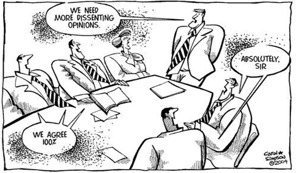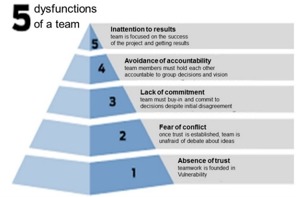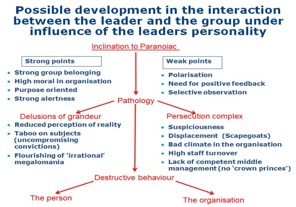PRECONDITIONS FOR A WELL FUNCTIONING TEAM
Before we can speak about a well functioning team, the team will need to surmount a number of levels of dysfunction.
There must be a climate of mutual trust, an open debate, team members must show commitment to the team’s decisions, take responsibility and keep attention to results.
In his book The Five Dysfunctions of a Team, Patrick Lencioni[1] reveals the basics of teamwork.
The five dysfunctional levels to overcome are:
1 Absence of Trust
2 Fear of Conflict
3 Lack of Commitment
4 Avoidance of Accountability
5 Inattention to Results
[1] P. Lencioni, 2002. The Five Dysfunctions of A Team
Or the negative consequence of the (mis-) leadership of destructive charismatic leaders on which theme Kets de Vries (INSEAD) has published quite some books.[3] See picture to the right: After an initially strong mobilisation phase, the addicted followers will stay on and non-conformists will leave the organisation.
This may eventually lead to a ‘folie à deux’-relation [4] between the leader and his followers and may end in a disaster.
[3] Anyone who has watched a company go through a change of leadership is keenly aware of how strongly the personality of the chief executive can shape performance. Manfred F.R. Kets de Vries, Clinical Professor of Leadership Development at INSEAD business school, has built his career on studying this impact.
But even if the team has overcome the five dysfunctional levels, there is the possibility of diseases like ‘Group Think’ or ‘the Abilene Paradox’. [2]
In an Abilene paradox a group of people collectively decide on a course of action that is counter to the preferences of many (or all) of the individuals in the group.
[2] Harvey, Jerry B. (1988): The Abilene Paradox and Other Meditations on Management.
[4] Folie à deux: French for "madness of two", or shared psychosis, is a psychiatric syndrome in which symptoms of a delusional belief and hallucinations are transmitted from one individual to another.
There is a substantial risk for developing dysfunctional team behaviour under particularly narcistic, charismatic leaders.
A well-balanced relation between the leader and the other team members is therefore of imminent importance.
Strong leaders need countervailing powers in their team.







